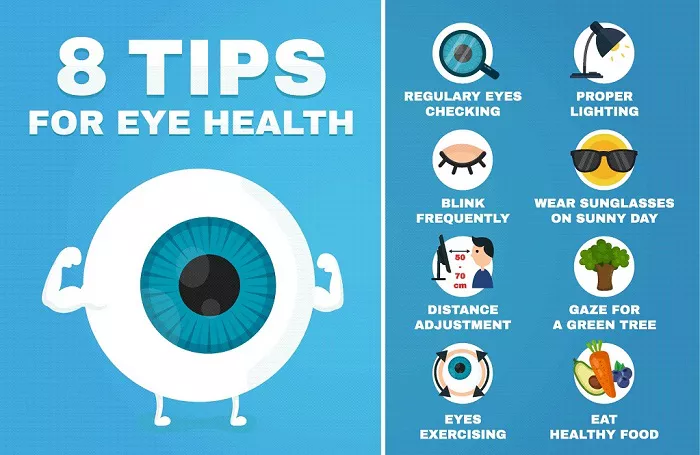Maintaining optimal eye health is essential for overall well-being. While corrective lenses and surgical interventions are common solutions, there are natural methods to enhance and preserve vision. This comprehensive guide explores various strategies, including nutrition, supplements, eye exercises, lifestyle adjustments, and current beauty trends, to support and improve your eyesight.
What is Eye Health
The eyes are complex organs that rely on a combination of factors to function correctly. Visual acuity can be influenced by genetics, age, environmental exposures, and lifestyle choices. Common vision issues include:
Myopia (Nearsightedness): Difficulty seeing distant objects clearly
Hyperopia (Farsightedness): Difficulty focusing on close objects
Astigmatism: Blurred vision due to an irregularly shaped cornea
Presbyopia: Age-related difficulty in focusing on close objects
While some conditions require medical intervention, adopting healthy habits can prevent or slow the progression of vision problems.
Nutritional Support for Eye Health
A balanced diet rich in specific nutrients plays a crucial role in maintaining and improving vision.
Essential Vitamins and Minerals
Vitamin A: Supports the functioning of the retina and prevents night blindness. Sources include carrots, sweet potatoes, and spinach.
Vitamin C: An antioxidant that protects the eyes from oxidative damage. Found in citrus fruits, strawberries, and bell peppers.
Vitamin E: Protects eye cells from free radicals. Present in nuts, seeds, and green leafy vegetables.
Zinc: Essential for transporting vitamin A from the liver to the retina. Found in oysters, beef, and legumes.
Carotenoids
Lutein and Zeaxanthin: These antioxidants accumulate in the retina and help filter harmful blue light. Sources include kale, corn, and eggs.
Omega-3 Fatty Acids
Omega-3s, particularly DHA, are vital for retinal health and may reduce the risk of macular degeneration. Found in fatty fish like salmon and flaxseeds.
Eye Health Supplements
For individuals who may not obtain sufficient nutrients through diet alone, supplements can be beneficial.
AREDS and AREDS2 Formulations
The Age-Related Eye Disease Studies (AREDS and AREDS2) conducted by the National Eye Institute found that specific combinations of vitamins and minerals can slow the progression of age-related macular degeneration (AMD). The AREDS2 formula includes:
- Vitamin C (500 mg)
- Vitamin E (400 IU)
- Lutein (10 mg)
- Zeaxanthin (2 mg)
- Zinc (80 mg)
- Copper (2 mg)
These supplements are widely available and can be considered after consulting with a healthcare provider.
Eye Exercises and Practices
Regular eye exercises can alleviate strain and improve focus.
20-20-20 Rule
Every 20 minutes, look at something 20 feet away for 20 seconds to reduce eye strain from screens.
Palming
Rub your hands together to generate warmth, then gently cup your palms over your closed eyes without applying pressure. This technique relaxes the eye muscles.
Focus Shifting
Hold your thumb about 10 inches from your face and focus on it for 15 seconds, then shift your focus to an object 10–20 feet away for another 15 seconds. Repeat several times.
Lifestyle Adjustments
Incorporating certain habits into your daily routine can significantly impact eye health.
Regular Eye Exams
Schedule comprehensive eye exams annually to detect issues early and update prescriptions as needed.
Protective Eyewear
Wear sunglasses that block 100% of UVA and UVB rays to protect against cataracts and macular degeneration.
Screen Time Management
Limit exposure to screens and ensure proper lighting to minimize eye strain. Use blue light filters when necessary.
Smoking Cessation
Smoking increases the risk of developing cataracts and AMD. Quitting smoking benefits overall and ocular health.
Beauty Trends and Eye Health
Current beauty trends emphasize natural aesthetics, which can positively influence eye health.
Minimalist Makeup
The “clean-girl” aesthetic promotes minimal makeup use, reducing the risk of eye irritation and infections associated with heavy cosmetics.
Lash and Brow Care
Nourishing serums and conditioners enriched with biotin and peptides are gaining popularity for enhancing natural lashes and brows without harsh treatments.
Eye-Friendly Products
Opt for hypoallergenic and ophthalmologist-tested products to minimize adverse reactions.
User Tips for Maintaining Eye Health
Stay Hydrated: Adequate hydration prevents dry eyes.
Adequate Sleep: Ensure 7–8 hours of sleep to allow eyes to rest and repair.
Balanced Diet: Incorporate a variety of fruits, vegetables, and omega-3-rich foods.
Limit Alcohol: Excessive alcohol can lead to nutritional deficiencies affecting eye health.
Manage Chronic Conditions: Control blood pressure and blood sugar levels to prevent complications like diabetic retinopathy.
Conclusion
Improving and maintaining eyesight involves a multifaceted approach, combining proper nutrition, regular eye exercises, lifestyle modifications, and mindful beauty practices. By adopting these strategies, you can support your eye health and potentially enhance your vision naturally. Always consult with an eye care professional before starting any new supplement or exercise regimen to ensure it aligns with your individual health needs.
Related topics:


